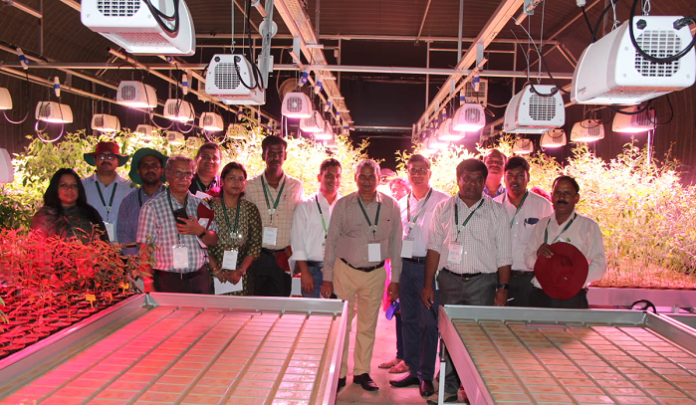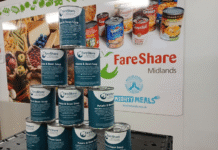In a significant development for India’s agricultural landscape, ICRISAT and the National Food Security Mission (NFSM), under the government of India, are embarking on an ambitious project aimed at revolutionizing pigeonpea yields across the country.
Despite being one of the largest producers of pigeonpea globally, India’s domestic consumption surpasses its production levels, leading to the need for imports.
Pigeonpea, also known as arhar dal, performs a vital role in ensuring nutrition, food security and supporting rural livelihoods in India, making it imperative to enhance its productivity to meet the nation’s increasing demand.
The project launched on 29 May is now set to begin in the upcoming cropping season that will see a collaboration with the Indian Institute of Pulses Research (IIPR) Kanpur and 12 state agricultural universities.
The project will test and promote high-yielding, early-maturing varieties and hybrids across the states of Telangana, Andhra Pradesh, Karnataka, Maharashtra, Madhya Pradesh, Jharkhand, Chhattisgarh, Rajasthan, Bihar, Uttar Pradesh, Punjab, and Haryana.
Director general of ICRISAT Jacqueline Hughes expressed her gratitude to the Government of India, collaborating institutes and universities for their commitment to enhancing pigeonpea yields while uplifting rural livelihoods.
“This collaboration, underscored by advancements in science, will not only push the boundaries of achievable yields but in doing so pave the way for a brighter future, ensuring food security and enhanced prosperity for the nation’s pigeonpea farming communities,” said Hughes.
Deputy director general (research) at ICRISAT, Arvind Kumar thanked the government for their support and inclusion of niche areas in Northern India for the initiative.
“To expand the cultivation of pigeonpea, we need to leverage the vast rice fallows across the country as research conducted by ICRISAT has shown promising results for early-maturing pigeonpea in rice fallows.
“Collaborative efforts will be made to develop varieties tolerant to waterlogging and cooler temperatures, enabling cultivation in both rainy (kharif) and post-rainy seasons (rabi),” said Kumar.
Aditya Pratap, coordinator-All India Coordinated Research Project on Kharif Pulses, highlighted key areas of focus for the project. These include combating pod-borer infestation, stabilizing hybrid production, integrating genomics, and reintroducing marker-assisted selection in the breeding process.
“By providing farmers a package of agronomy practices alongside new varieties and hybrids, a potential 30% increase in pigeonpea yields can be achieved,” said Pratap.
Discussions on the project work plan were led by Prakash Gangashetty, scientist, Pigeonpea Breeding, ICRISAT and the project launch provided an opportunity for participants to visit ICRISAT’s research fields and the speed breeding facility.
Sean Mayes, research program director of the Accelerated Crop Improvement Program at ICRISAT, emphasized the significance of these facilities, capable of raising three generations per year and producing seeds even during the off-season.
RS Mahala, research director at SeedWorks International Private Ltd concluded on the importance of finding innovative solutions and cited successful experiments with high-density spacing and beekeeping for natural pollination.
“ICRISAT’s vast germplasm collection is a valuable resource that should be effectively utilized to achieve the project’s objectives,” said Mahala.
The three-year project ‘Enhancing pigeonpea production and productivity in India by promoting high-yielding early maturing varieties and hybrids’ is led by ICRISAT in partnership with IIPR-Kanpur and Uttar Pradesh.
Other participating universities are Punjab Agricultural University, Ludhiana, Punjab; Bihar Agricultural University, Sabour, Bihar; Rajmata Vijayaraje Scindia Krishi Vishwa Vidyalaya, Sehore, Madhya Pradesh; Agricultural University (AU), Kota, Rajasthan; Indira Gandhi Krishi Vishwavidyalaya (IGKV), Raipur, Chhattisgarh; Birsa Agricultural University (BAU), Kanke, Ranchi, Jharkhand; Dr. Panjabrao Deshmukh Krishi Vidyapeeth (PDKV), Akola, Maharashtra; University of Agricultural Sciences (UASR), Raichur, Karnataka; Professor Jayashankar Telangana State Agricultural University (PJTSAU), Telangana; and Acharya N. G. Ranga Agricultural University (ANGRAU), Guntur, Andhra Pradesh.
IndiFoodBev — authentic, impactful and influential
An English-language food and beverage processing and packaging industry B2B platform in print and web, IndiFoodBev is in its third year of publication. It is said that the Indian food and beverage industries represent approximately US$ 900 billion in revenues which implies more than 20% of the country’s GDP. Eliminating the wastage on the farmside can help to deliver more protein to a higher number of the population apart from generating sizable exports. The savings in soil, seeds, water, fertilizer, energy and ultimately food and nutrition could be the most immense contribution that country is poised to make to the moderation of climate change.
To improve your marketing and grow sales to the food and beverage processing and packaging industry, talk to us. Our research and consulting company IppStar [www.ippstar.org] can assess your potential and addressable markets in light of the competition. We can discuss marketing, communication, and sales strategies for market entry and growth.
Suppliers and service providers with a strategy and budget for targeted marketing can discuss using our hybrid print, web, video, and social media channels to create brand recognition linked to market relevance. Our technical writers are ready to meet you and your customers for content.
The second largest producer of fruit and vegetables in the world is continuously expanding processing capacities and delivery systems with appropriate innovative technologies. We cover product and consumer trends, nutrition, processing, research, equipment and packaging from farm to thali. Get our 2025 media kit and recalibrate your role in this dynamic market. Enhance your visibility and relevance to existing markets and turn potential customers into conversations. Ask for a sample copy of our bi-monthly in print or our weekly IndiFoodBev eZine each Wednesday.
For editorial info@ippgroup.in — for advertisement ads1@ippgroup.in and for subscriptions subscription@ippgroup.in
Naresh Khanna – 10 February 2025
Subscribe Now











